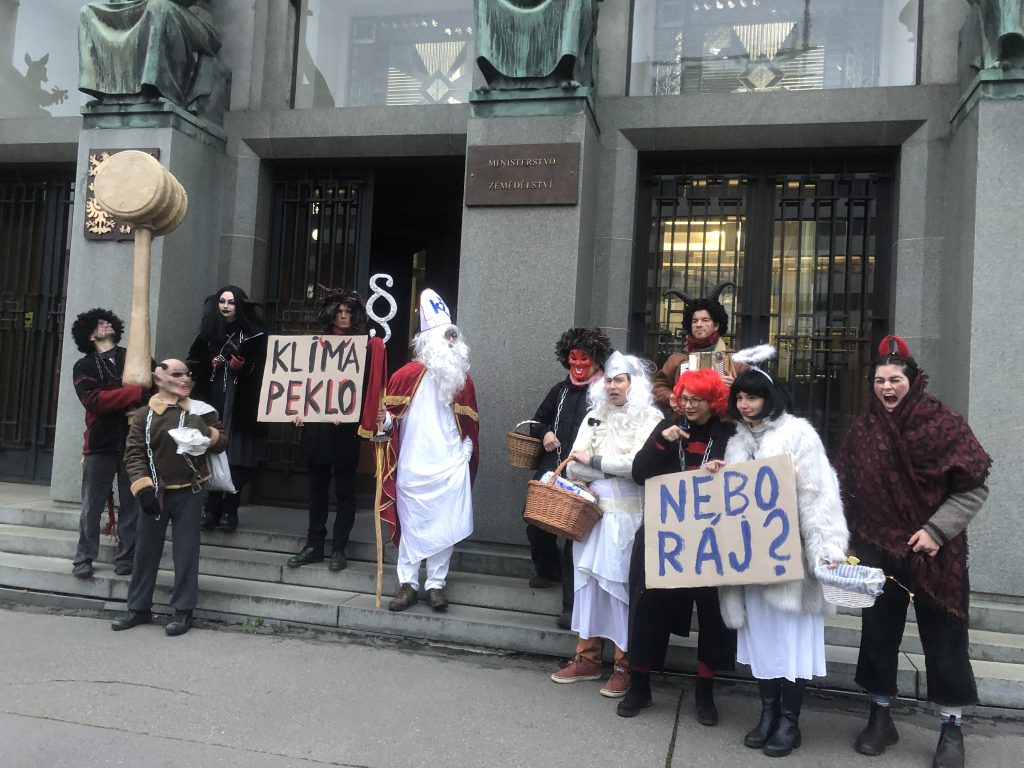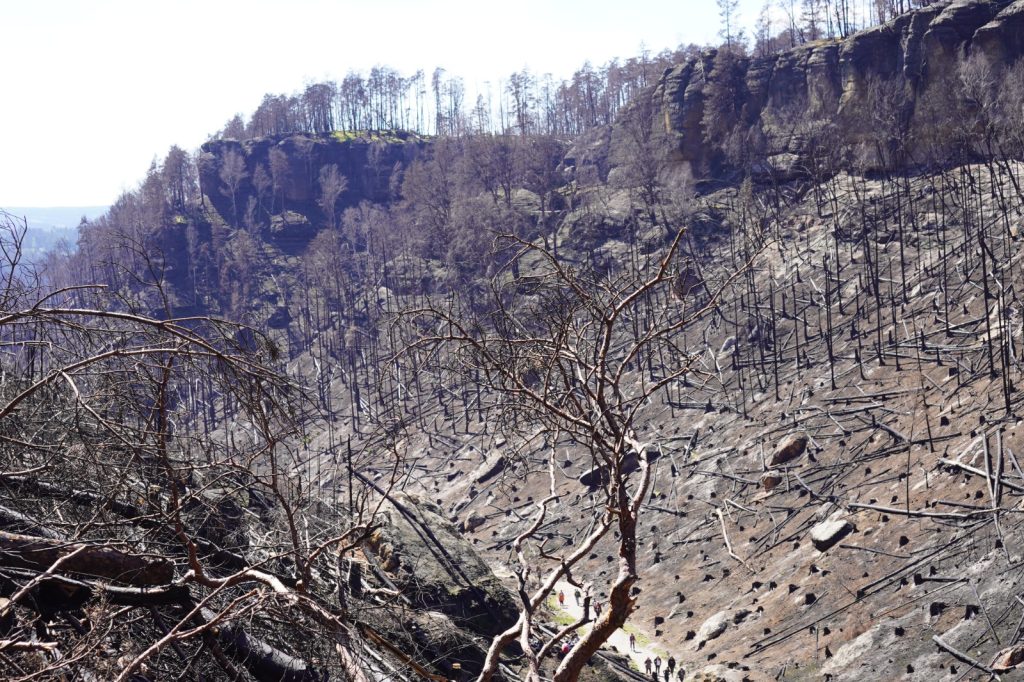The promise and demise of an unfulfilled climate judgment in Prague
Arshu John –
While the Czech Republic’s presidency over the Council of the European Union last year received praise for spearheading significant climate policies despite the war in Ukraine, domestically, its climate record has come into question. A climate NGO called Klimatická Žaloba adopted the increasingly popular approach of strategic litigation to seek greater climate action in the country. It challenged the climate policies of the federal government and four Czech ministries, questioning their efficacy in meeting the European Union targets for the reduction of greenhouse gas emissions. After a short-lived promise of a landmark climate judgment by the court of first instance, the appellate court spelt the judgment’s demise soon after.
On 20 February 2023, the Supreme Administrative Court of the Czech Republic reversed a landmark judgment by the Municipal Court of Prague, and in the process, crushed hopes for the promise of climate litigation in the country. The municipal court’s ruling was the result of the first major climate litigation in the Czech Republic, which was spearheaded by the civil-society group Klimatická Žaloba, and bolstered the potential of climate action through strategic litigation. The SAC’s judgment, however, sets aside most of its findings, and draws clear boundaries of judicial overreach, legislative assessments and executive manoeuvring— all while acknowledging the “seriousness of the threats that the Czech Republic and the world are facing as a result of global warming.”

celebrating St. Nicholas Day by visiting Czech ministries that had failed to implement a
landmark climate judgment. Klimatická Žaloba had won the case before the Municipal Court
of Prague, but in February this year, the Supreme Administrative Court ruled against them.
To understand the importance of the SAC’s judgment, it is necessary to understand the significance of the one delivered by the Municipal Court of Prague (MCP). In 2019, Klimatická Žaloba approached the public-action law firm Frank Bold to seek their opinion on whether a strategic climate litigation could be pursued in the Czech Republic. Strategic litigation refers to the practice of engaging in court-centric advocacy with the aim of achieving rights-related changes in law, policy or practice. In recent years, strategic litigations for climate policy have become a global phenomenon, and has seen a particularly uptick in the EU.
“Klimatická Žaloba was formed specifically for this case, for climate litigation in Czech Republic,” Martin Abel, one of the founding members, told me. “It is an NGO, with around 300 volunteers, and its sole purpose is to take climate action against government and win it.” After nearly two years of conducting research and analysis with Frank Bold, in 2021, Klimatická Žaloba filed a case against the Czech government and the ministries of environment, industry and trade, agriculture and transport.
The MCP delivered its landmark verdict in June last year. Among its main findings was that the Czech government and ministries had not taken sufficient measures to meet the European Union’s commitments to the Paris Agreement, and directed them to take further mitigation measures to reduce carbon emissions. Most significantly, the court held that as a member of the European Union, the Czech Republic could be held individually responsible to meet the EU’s obligations under the Paris Agreement.

climate crisis is alive in the country, it is because of all the climate NGOs.” Abel was a founding
member of Klimatická Žaloba, which was first formed to file the climate litigation against the
Czech government, and has since conducted numerous educational campaigns as well.
The overarching goal of the Paris Agreement is to ensure that the increase in global average temperature is restricted to less than 2ºC—and pursue efforts to keep it to below 1.5ºC—compared to the pre-industrial levels of 1990. To meet these obligations, the European Union submitted its nationally determined contributions (NDC) in December 2020, and undertook to reduce emissions in the region by 55 percent by 2030 compared to pre-industrial levels. In addition, the EU also has resolved a long-term goal of ensuring climate neutrality— an economy with net-zero greenhouse gas emissions—by 2050.
Klimatická Žaloba’s main submission before the MCP and SAC was that it would be impossible for the Czech Republic to meet these targets with the current policies in place. “Even 55 percent is too less,” Laura Otýpková, the lead lawyer with Frank Bold working on the case, said. “The carbon budget would get depleted and carbon neutrality by 2050 would be an impossibility. As per the new scientific studies that we have quoted, we need to aim for emission reductions of 80 percent by 2030, and we are not even close to managing 55 percent.”
The Czech government and ministries, on the other hand, argued that they could not be held individually responsible to the commitments of the European Union. They argued that the NDCs submitted by the EU as part of the Paris Agreement were a collective obligation, but the individual obligations of each member state would be a subject of diplomatic and legislative decision-making processes that were yet to take place. This was the main point of dispute between the two court judgments—and the SAC agreed with the government.

hopeful after the Municipal Court ruled in their favour, but she also expected the Supreme
Administrative Court to set aside the findings—as it did. “It is a complicated case, I did not
envy the judges deciding it,” she said.
The MCP had observed that even though the “EU can set and monitor the differentiated partial contributions of its Member States,” the individual responsibility of each country “cannot be downplayed.” The MCP even went further to state that “the possible future setting of lower individual reduction targets for individual EU Member States compared to the EU NDCs … does not preclude a more ambitious target by the Czech Republic.”
However, this line of argument did not find favour with the SAC. The appellate court held that the Czech Republic does not assume any individual obligations through the EU’s NDC to the Paris Agreement. The SAC observed that the relevant legislative processes for the same were still underway, and as such, the MCP could not impose obligations on the Czech Republic that were not specifically mandated by the EU for individual states. The court held, “This is a typical situation in which the premature interference by the judiciary could lead to depriving the legislative or executive bodies of the EU and the Czech Republic of the necessary room for manoeuvre for assessment and negotiation.”
The SAC noted that the Czech Republic could be held accountable to the significantly less ambitious commitments approved by the European Parliament and the Council, which set a target of 14 percent reduction of emissions compared to 2005 levels for the Czech Republic. However, as the MCP had noted in its judgment, these commitments were only consistent with a 40 percent reduction to 1990 levels. According to the lawyer Otýpková, “Czech Republic is among the most carbon intensive country in the European Union, and even for the EU, the aim should be at least 66 percent reduction.” Abel, too, noted, “55 percent is a joke and we are not even on our way there.”

protesting members of Klimatická Žaloba on St. Nicholas Day for not implementing the
Municipal Court’s judgment. But according to Dusik, and as subsequently affirmed by the
Supreme Administrative Court, the ministry had not breached any climate obligations because
the Czech Republic was not accountable to the EU’s climate targets under the Paris Agreement.
After the MCP’s judgment, Abel and Otýpková both noted that despite the judgment having legal validity for over six months before the SAC ruled, the government and the ministries did not implement any measures in accordance with the MCP’s verdict. “They implemented nothing at all, no extra measures,” Abel said. “Meanwhile, the German government had announced new measures just two weeks after the constitutional court ruled in a climate case in Germany.” Otýpková similarly observed, “The state did nothing to comply with it.” But according to Jan Dusik, the deputy minister for environment, they were never in violation “because there is no commitment at the Czech level so we were not breaching any obligations.”
Abel expressed his disappointment that the ministries appealed in the judgment in the first place, instead of using it as an opportunity to introduce new climate policies in the country. He added that Klimatická Žaloba had not even been satisfied with the MCP’s judgment. “The legal obligations are from the Paris Agreement, and in order to make that happen, 55 percent is not enough.”
The SAC’s judgment commented on the absence of a climate law in the Czech Republic. The court observed how a climate law—such as ones enacted in Denmark, France, Germany, Ireland, the Netherlands or Spain—would guide the court in cases against government inaction in the fight against climate change. It also noted the likelihood of a ruling by the European Court of Human Rights in a climate litigation that would set a precedent for the country’s courts, in the wake of the rise of climate litigations in recent years.

policies in the Czech Republic, climate disasters such as the recent wildfire in Hrensko that
ravaged the national forest spell the need for urgent action. Meanwhile, Czech Republic
remains one of the most carbon intensive countries in the European Union.
There is no dispute, the court noted, “that the effects of climate change are and will continue to affect a range of guaranteed fundamental rights in various ways.” Klimatická Žaloba has decided to re-litigate aspects of the SAC’s judgment in the municipal court, and perhaps even take it to the constitutional court of the Czech Republic. In the meanwhile, it remains to be seen whether the Czech government takes to ensure that the European Union meets its climate targets. Abel is not optimistic. “If the issue of the climate crisis is alive in the country, it is because of all the climate NGOs, but the government is silent.”
Photos and text by Arshu John.
The article was written in the course Foreign Correspondence under the supervision of Mgr. Veronika Macková, Ph.D. and doc. PhDr. Alice Němcová Tejkalová, Ph.D.




